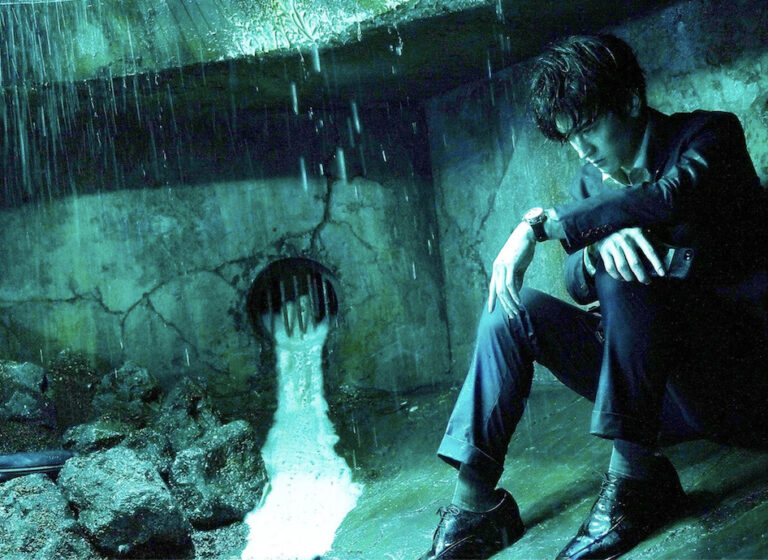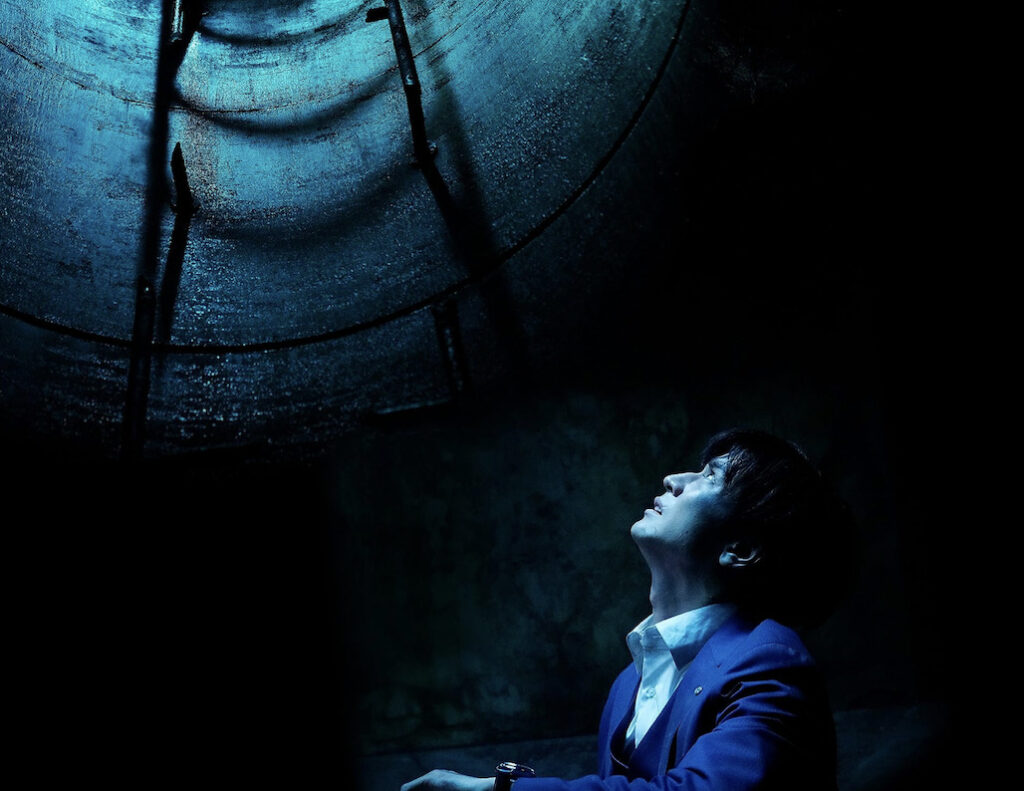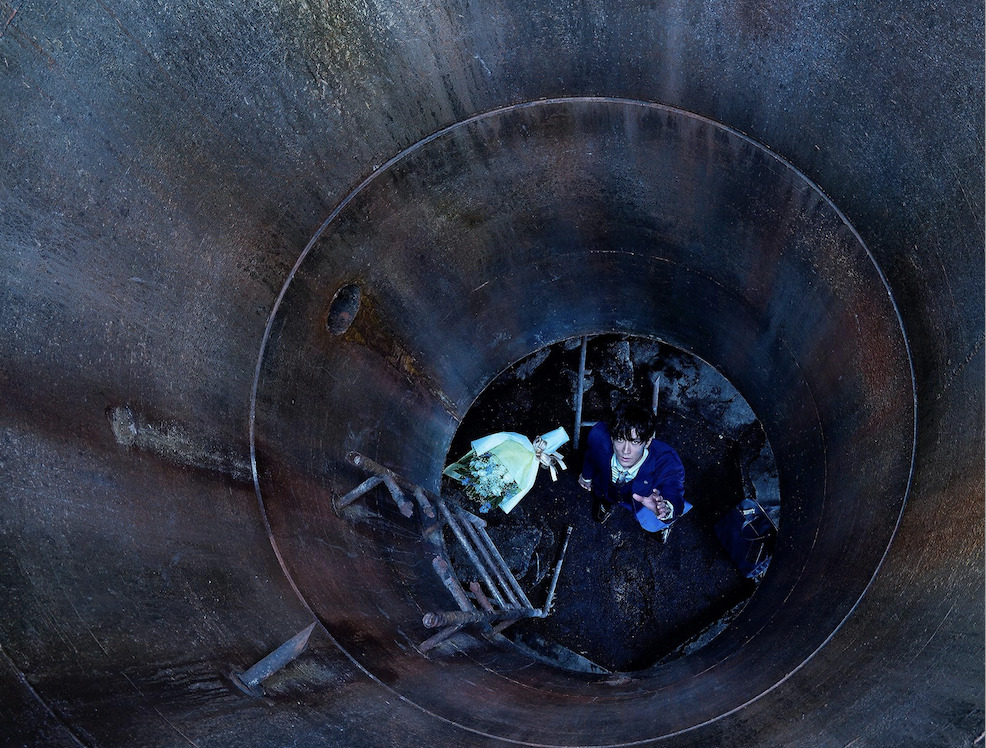
©2023 Gaga Corporation/J Storm Inc.
People who effortlessly fall into a seemingly perfect life usually have the most challenging time saving themselves when they descend into a sinister situation that can potentially ruin their existences. That’s certainly the case for the sole character of the single-location survival suspense thriller, #Manhole. The movie offers an intimate examination into the dire situation that the protagonist stumbles his way into that forces him to finally learn how to accept and atone for his true nature.
#Manhole, which was penned by Japanse screenwriter, Michitaka Okada, is presented in Japanese with English subtitles. The drama was directed by fellow Japanese filmmaker, Kazuyoshi Kumakiri.
#Manhole follows Shunsuke (Yûto Nakajima, of the Japanese boy band Hey! Say! JUMP), the top salesperson at the real-estate firm where he works, as he’s preparing to marry his boss’ daughter. Handsome and self-effacing, he earns the respect, as well as the jealousy to some degree, of his friends and colleagues.
The night before Shunsuke’s wedding, his colleagues and friends throw him a surprise party, where the alcohol flows freely. The fun abruptly ends, however, after he leaves the party and starts walking home. Suddenly feeling groggy and unsteady, he tumbled into a deep, dirty, concrete manhole.
When he becomes fully aware to his troubling situation, Shunsuke realizes that the ladder leading out of the manhole is broken, and there aren’t any passersby to hear him yell for help. Even more troubling is the fact that his leg has been badly gashed during his fall.
When Shunsuke uses his cellphone to reach out to friends for help, the calls go unanswered. When he’s finally forced to call the police, they ultimately prove to be unhelpful in being able to find him, due in part to his GPS malfunctioning. The one person he’s then able to reach, his ex-girlfriend Mai (Nao), isn’t much more help, either, as she seems to still be resentful over the way he ended their romance five years ago.

©2023 Gaga Corporation/J Storm Inc.
As a result, Shunsuke turns to social media and creates a false identity to convince strangers to help find him. But he soon discovers that pretending to be someone else can have rather complicated consequences.
The single-space survival thriller thrives in its interweaving of Nakajima’s captivating performance and stellar visuals. In his third lead feature film role, the performer has mastered the process of infusing his character with a natural relatability as he tries to find a solution to his newfound dilemma of being stuck in the titular manhole.
The actor also built upon the subtle hints that Okada infused into the script about Shunsuke’s seemingly dubious background and history. While the actor amplified the likable elements of the protagonist, there are some odd behaviors that he engages in that also add suspense to who he really is and if falling into the manhole was truly an accident. From deleting his call history on his cell phone to being hesitant to call the police for help and not sharing his real identity on the social media profile he created, the reasons behind actions of the primary character ultimately pay off during the movie’s third act.
Besides Nakajima’s intense performance and Okada’s intriguing script, #Manhole also thrives on its creative visuals. The drama’s production designer, Norifumi Ataka, created a crafty contained space environment that emphasizes how the walls are literally and figuratively closing in on Shunsuke’s life, without feeling too claustrophobic. With the help of external environmental forces that highlight the character’s potential downfall, from rain pouring down into the uncovered manhole to toxic foam seeping from open pipes, the small space’s ever-changing look reflects the protagonist’s toxic evolving personality.
Besides being a slick single-location survival thriller that thrives on its enthralling characterization and riveting production design, the feature also creates exhilarating suspense through its timely social media satire. The hashtag before the film’s title emphasizes how modern society finds more validation in securing support from strangers they met online than help from the police.
When Shunsuke starts to feel as both the police and Mai aren’t taking his concerns about being rescued seriously, he sets up his new account on a Twitter-like platform. He hopes that by creating the account and recounting his troubles, but changing his identity to instead present himself as a completely helpless woman, a few true crime sleuths will come to his rescue.
#Manhole‘s cinematographer, Yuta Tsukinaga, worked with Kumakiri to create the social media action over a intriguing split screen. Shunsuke is seen writing his pleas for help and reading the public’s growing support to help find him, with the messages overlapping over him in diverse fonts. Tsukinaga brilliantly kept Nakajima in focus while reads and writes the messages, which he starts to believe his life depends on the longer he remains trapped in the manhole.
#Manhole is a surprisingly effective survival suspense thriller that effectively utilizes modern societal norms, notably daily reliance on social media for life-affirming validation and rescuing, to tell its powerful story. Between Nakajima’s riveting portrayal of Okada’s ever-evolving characterization of the elusive sole character, Ataka making the single location feel spacious and Tsukinaga crafting intriguing split screens during the social media montages, #Manhole is a brilliant cautionary tale. The overall movie fearlessly explores how people not being completely honest with the people in the real world, as well as themselves, can plunge them into an existential crisis with dire, irreversible results.

©2023 Gaga Corporation/J Storm Inc.
Grade: B+
#Manhole had its American East Coast premiere on July 16 at Film at Lincoln Center’s Walter Reade Theater during the 22nd New York Asian Film Festival (NYAFF).

